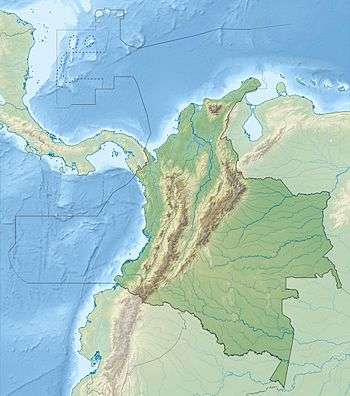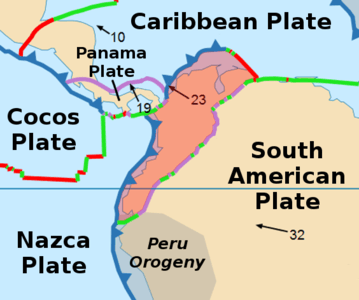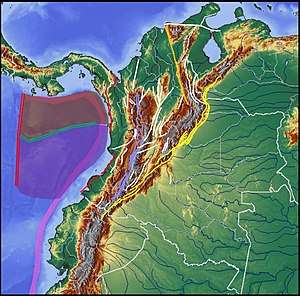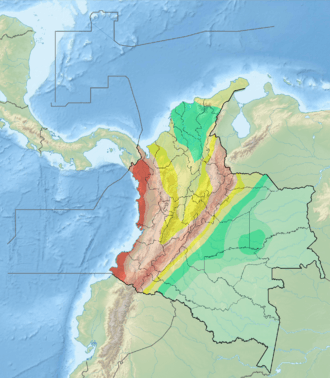Toro Fault
The Toro Fault (Spanish: Falla de Toro) is a sinistral strike-slip fault in the departments of Valle del Cauca and Risaralda in western Colombia. The fault has a total length of 61.9 kilometres (38.5 mi) and runs along an average north to south strike of 006.6 ± 8 in the Western Ranges of the Colombian Andes.
| Toro Fault | |
|---|---|
| Falla de Toro | |
 | |
| Etymology | Toro |
| Country | |
| Region | Andean |
| State | Risaralda, Valle del Cauca |
| Characteristics | |
| Range | Western Ranges, Andes |
| Part of | Andean strike slip faults |
| Length | 61.9 km (38.5 mi) |
| Strike | 006.6 ± 8 |
| Dip | unknown |
| Displacement | <0.2 mm (0.0079 in)/yr |
| Tectonics | |
| Plate | North Andean |
| Status | Inactive |
| Type | Strike-slip fault |
| Movement | Sinistral |
| Age | Quaternary |
| Orogeny | Andean |
Etymology
The fault is named after Toro, Valle del Cauca.[1]
Description
The Toro Fault cuts accreted oceanic rocks of the Western Ranges of the Colombian Andes, close to the Cauca River valley. It is one of the faults of the regional Cauca-Patía Fault System that bounds the eastern side of the Western Ranges along most of the range's length. This well developed fault trace has an eroded fault scarp, degraded triangular facets, and the fronts of spurs show evidence of sinistral deformation.[1]
References
- Paris et al., 2000a, p.51
Bibliography
- Paris, Gabriel; Michael N. Machette; Richard L. Dart, and Kathleen M. Haller. 2000a. Map and Database of Quaternary Faults and Folds in Colombia and its Offshore Regions, 1–66. USGS. Accessed 2017-09-18.
Maps
- Paris, Gabriel; Michael N. Machette; Richard L. Dart, and Kathleen M. Haller. 2000b. Map of Quaternary Faults and Folds of Colombia and Its Offshore Regions, 1. USGS. Accessed 2017-09-18.
Further reading
- Page, W.D. 1986. Seismic geology and seismicity of Northwestern Colombia, 1–200. San Francisco, California, Woodward-Clyde Consultants Report for ISA and Integral Ltda., Medellín.


